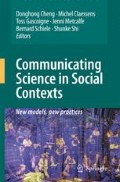Abstract
Sociologists have diagnosed an increasing ‘medialization’ of science—that is, an orientation towards the mass media, with the consequence that media criteria become relevant within science. The medialization of science is seen in this chapter as a consequence of the medialization of politics. Based on empirical surveys of German researchers, public information officers of science organizations and decision-makers in the political-administrative system, as well as a hermeneutical analysis of German press coverage, the authors analyse the manifestations and political impacts of medialization in the public communication of scientists and science organizations. Two biomedical fields—stem cell research and epidemiology—are used as case studies. Results of the empirical analyses support the hypothesis that the medialization of science, in so far as it guides the public communication strategies of scientific actors, increases the chances of scientific actors being noticed and taken seriously by the political-administrative system. Effects are seen in a contribution to the legitimization of science by reinforcing the perception of its social relevance and in improving the chances of scientific expertise becoming effective in policy-making.
The following primary researchers participated in the international survey of biomedical scientists, the results of which we refer to in this chapter: Sharon Dunwoody and Dominique Brossard (United States), Steve Miller (United Kingdom), Suzanne de Cheveigné (France) and Shoji Tsuchida (Japan).
This chapter was originally published in German in Renate Mayntz, Friedhelm Neidhardt, Peter Weingart and Ulrich Wengenroth (Eds.), Wissensproduktion und Wissenstransfer—Wissen im Spannungsfeld von Wissenschaft, Politik und Öffentlichkeit, transcript Verlag, Bielefeld, 2008. We thank transcript Verlag for its generous approval of this translation and permission to reprint it in this volume.
Access this chapter
Tax calculation will be finalised at checkout
Purchases are for personal use only
Preview
Unable to display preview. Download preview PDF.
References
Baerns, B. (1990). Wissenschaftsjournalismus und Öffentlichkeitsarbeit. In S. Ruß-Mohl (Ed.), Wissenschaftsjournalismus und Öffentlichkeitsarbeit. Tagungsbericht zum 3, Colloquium Wissenschaftsjournalismus vom 4/5 November 1988 in Berlin. Gerlingen: Bleicher, 37–53.
Dahinden, U. (2006). Framing. Eine integrative Theorie der Massenkommunikation. Konstanz: UVK.
Dunwoody, S. & Ryan, M. (1985). Scientific barriers to the popularisation of science in the mass media. Journal of Communication, 35, 26–42.
Gamson, W. A. & Modigliani, A. (1989). Media discourse and public opinion on nuclear power: A constructionist approach. American Journal of Sociology, 95, 1–37.
Heinrichs, H. & Petersen, I. (2006). Mediatisierte Politikgestaltung? Medien, Expertise und politische Entscheidungsprozesse in wissenschaftsbasierten Themenfeldern. Unpublished report, Institute for Environmental and Sustainability Communication, University of Lüneburg.
Heinrichs, H., Petersen, I. & Peters, H. P. (2006). Medien, Expertise und politische Entscheidung: das Beispiel Stammzellforschung. In R. Wink (Ed.), Deutsche Stammzellpolitik im Zeitalter der Transnationalisierung. Baden-Baden: Nomos, 119–140.
Imhof, K. (2006). Mediengesellschaft und Medialisierung. Medien & Kommunikationswissenschaft, 54, 191–215.
Jung, A. (2007a). Generalisierte Bedeutungsstrukturen als Mechanismus gesellschaftlicher Integration: Das massenmediale Konstrukt von Wissenschaft im Kontext der Stammzellforschung. Unpublished paper, Programme Group Humans–Environment–Technology, Research Centre Jülich.
Jung, A. (2007b). Proximity between science and its social environment: A paradoxical effect? Epidemiology and stem cell research in the German media. Unpublished paper, Programme Group Humans–Environment–Technology, Research Centre Jülich.
Kepplinger, H. M. (2002). Mediatisation of politics: Theory and data. Journal of Communication, 52, 972–986.
Knorr Cetina, K. D. (1981). The manufacture of knowledge: An essay on the constructivist and contextual nature of science. Oxford: Pergamon.
Kohring, M. (2005). Wissenschaftsjournalismus: Forschungsüberblick und Theorieentwurf. Konstanz: UVK.
Maasen, S. & Weingart, P. (2006). Unternehmerische Universität und neue Wissenschaftskultur. Die Hochschule, 15, 19–45.
Merten, K. (2000). Das HandwÖrterbuch der PR, Bd. 1. Frankfurt: F.A.Z. Institut.
Palmer, J. (2000). Spinning into control. News values and source strategies. London: Leicester University Press.
Peters, H. P. (2008): Erfolgreich trotz Konfliktpotential—Wissenschaftler als Informationsquellen des Journalismus. In H. Hettwer, M. Lehmkuhl, H. Wormer & F. Zotta (Eds.), Wissenswelten: Wissenschaftsjournalismus in Theorie und Praxis. Gütersloh: Bertelsmann Stiftung, 108–130.
Peters, H. P. & Heinrichs, H. (2005). Öffentliche Kommunikation über Klimawandel und Sturmflutrisiken. Bedeutungskonstruktion durch Experten, Journalisten und Bürger. Jülich: Forschungszentrum Jülich.
Peters, H. P., Lang, J. T., Sawicka, M. & Hallman, W. K. (2007). Culture and technological innovation: Impact of institutional trust and appreciation of nature on attitudes towards food biotechnology in the USA and Germany. International Journal of Public Opinion Research, 19, 191–200.
Projektgruppe Risikokommunikation (1994). Kontakte zwischen Experten und Journalisten bei der Risikoberichterstattung’, Ergebnisse einer empirischen Studie. Unpublished report, Institut für Publizistik, Westfälische Wilhelms-Universität Münster.
Sarcinelli, U. (1989). Mediatisierung und Wertewandel: Politik zwischen Entscheidungsprozeß und politischer Regiekunst. In F. E. BÖckelmann (Ed.), Medienmacht und Politik. Mediatisierte Politik und politischer Wertewandel. Berlin: Wiss.-Verl. Spiess, 165–174.
Sarcinelli, U. (1998). Mediatisierung. In O. Jarren et al. (Eds.), Politische Kommunikation in der demokratischen Gesellschaft. Opladen: Westdeutscher Verlag, 678–679.
Schulz, W. (1976). Die Konstruktion von Realität in den Nachrichtenmedien. München: Alber.
Schulz, W. (2006). Medialisierung von Wahlkämpfen und die Folgen für das Wählerverhalten. In K. Imhof et al. (Eds.), Demokratie in der Mediengesellschaft. Wiesbaden: VS Verlag für Sozialwissenschaften, 41–57.
Shaw, D. L. & McCombs, M. E. (1977). The emergence of American political issues: The agenda-setting function of the press. St. Paul: West Publishing.
StrÖmer, A.-F. (1999). Wissenschaft und Journalismus. Unpublished masters thesis, Institut für Publizistik- und Kommunikationswissenschaft, Freie Universität Berlin.
Vowe, G. (2006). Mediatisierung der Politik? Ein theoretischer Ansatz auf dem Prüfstand. Publizistik, 51, 437–455.
Weingart, P. (2001). Die Stunde der Wahrheit? Zum Verhältnis der Wissenschaft zu Politik, Wirtschaft und Medien in der Wissensgesellschaft. Weilerswist: Velbrück.
Author information
Authors and Affiliations
Corresponding author
Editor information
Editors and Affiliations
Rights and permissions
Copyright information
© 2008 Springer Science+Business Media B.V
About this chapter
Cite this chapter
Peters, H.P., Heinrichs, H., Jung, A., Kallfass, M., Petersen, I. (2008). Medialization of Science as a Prerequisite of Its Legitimization and Political Relevance. In: Cheng, D., Claessens, M., Gascoigne, T., Metcalfe, J., Schiele, B., Shi, S. (eds) Communicating Science in Social Contexts. Springer, Dordrecht. https://doi.org/10.1007/978-1-4020-8598-7_5
Download citation
DOI: https://doi.org/10.1007/978-1-4020-8598-7_5
Publisher Name: Springer, Dordrecht
Print ISBN: 978-1-4020-8597-0
Online ISBN: 978-1-4020-8598-7
eBook Packages: Humanities, Social Sciences and LawSocial Sciences (R0)

